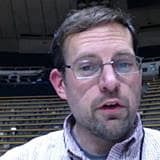
Last week, sea change came to NCAA sports, as student-athletes were freed from generations-long prohibition on their ability to benefit financially as college athletes, Name-Image-Likeness as it's come to be to known.
It's an "issue of fundamental fairness," as Purdue athletic director Mike Bobinski put it, echoing prevailing public opinion. To this point in time, NCAA athletes have been one of the few populations in America — and the only students on their own campuses — who've been unable to profit from their status, name recognition or even their talents outside of sports.
The change that came last week was one anticipated for years, an inevitability, really. Nevertheless, this is an existential change for college athletics at all levels of NCAA membership and one that doesn't come without complication.
It's been an awkward release, this change hurried along by legislation passed by several state governments, while others have stood down on the issue. There's been congressional involvement, with more likely to come. The NCAA, given years to get out in front of the issue, didn't establish policy on the matter until the 11th hour, prior to changes taking hold on July 1.
Now, NCAA schools' new reality, while generally welcomed, brings with it very new conditions on the ground, and the asking of myriad big-picture questions.
"So far, for all the wringing of hands and gloom-and-doom prognostications, I don't see it yet," Bobinski said, speaking with reporters Tuesday on the topic. "But again, we're very early with all of this."
At Purdue, there's been a flurry of activity.
A number of athletes have aligned themselves with the social media platform and web site Barstool Sports. Some have signed on with companies to do live chats — basketball's Sasha Stefanovic among them — or play video games with customers. A search of the word "Purdue" on the web site for the personalized-messaging service Cameo shows basketball players Trevion Williams and Isaiah Thompson and football players David Bell and Jaylan Alexander involved with the company. Basketball's Eric Hunter has announced plans to conduct a youth basketball camp in West Lafayette this summer. Offensive lineman Tyler Witt has taken public his services as a tattoo artist and running back Zander Horvath his custom artwork.
There are limits in place.
Purdue policy lines up with various state laws that bar athletes from associating themselves with a variety of things: Gambling, alcohol, mature content, etc. At Purdue, athletes cannot use Purdue branding, consistent with policy that would apply to the general student population. Purdue will no longer use student-athletes' images on any sponsored materials, Bobinski said, without their consent.
Schools are prohibited from striking deals with their own student-athletes and only can speak of the topic of NIL only generally in recruiting.
"That's the theory," Bobinski joked.
Any involvement on the school's part in lining up specific opportunities, or any opportunities that are found to be illegitimate — no-show jobs, compensation out of wack with market rates or such things — or intended as either recruiting or retention inducements are prohibited and would constitute NCAA violations.
That's the landscape in terms of controls put on this newly free market.
Purdue has encountered few others, since Indiana, home of the NCAA, was one of the states that did not pass NIL law.
"I actually at this moment in time would tell you that I'd prefer that we don't have a state law," Bobinski said, "because it gives us more flexibility in terms of how we craft our own guidelines internally and doesn't have us prescribed to a set of government-issued regulations. It's not an unlikely outcome that at some point the federal government, Congress, will enact a universal set of guidelines around this."
In the meantime, Bobinski's public stance on NIL has always been one of support and remains so, his hope being, too, that forays into the business world can also provide a complementary experience to student-athletes' education. Purdue's put considerable resources in place, partnering with the Krannert School of Business as a resource and a third-party branding and marketing company, INFLCR, through at least 2026.
"You have a chance here to unleash some creativity in a group of folks who weren't able to focus on this," Bobinski said. "We have a lot of bright folks here in our student-athlete population, as do schools all around the country, and I think there will probably be some creative things that we'll all look at that ... will be seen as positives."
Concern has been widely raised about the NIL's potential impact on recruiting, even though such things will be explicitly outlawed. You know how that goes.
For his part, Bobinski doesn't seem worried about what such things could mean for Purdue. He believes it can "help" Purdue.
"Our opportunities here at Purdue appeal to a certain type of young people. That's just a fact of life," he said. "People are attracted to Purdue because of our focus on substance and character and the great education we can provide, those kinds of things that aren't changing. Name-Image-Likeness isn't changing any of that. Purdue's still going to focus on those same fundamental values.
"This, to me, is value added, another layer of opportunity that can present itself."
July to date has been a whirlwind of social media announcements from athletes delving into this new era of the business of college sports, a whole new area where student-athletes will earn income for the first time ever and a legion of outsiders will likely make millions off this newfound economy.
The gold-rush phase of this, though, will settle down eventually.
"At some point, businesses are in business, and they're going to expect a return, expect value for whatever investment they make or relationship they strike ," Bobinski said. "You have to give it a little time for some evidence to come out to see whether these arrangements make sense for businesses at the end of the day."

